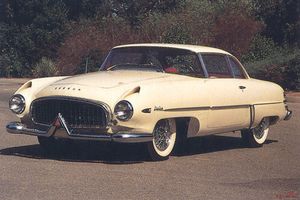.
Hudson Italia

| |
| Hudson Italia | |
|---|---|
| Hudson | |
| aka | Super Jet |
| Production | 1953 - 1954 26 units |
| Class | Mid-size Coupe |
| Body Style | 2-Door Coupe |
| Length | |
| Width | |
| Height | 52.8 in (1341.1 mm) |
| Wheelbase | 105 in (2667 mm) |
| Weight | |
| Transmission | 3-Speed Manual |
| Engine | 3.3 litre Straight-6 |
| Power | 114 hp (83.9 kw) @ 4000 rpm 158 lb-ft (214.2 nm) @ 1400.00 rpm |
| Similar | Hudson Jet |
| Designer | Frank Spring and Carlo Felice Bianchi Anderloni |
The Hudson Italia was a styling exercise based on the Hudson Jet. It went into production, but with a high price ($4,800) and the merger with Nash only 26 were ever made. To date, 21 have survived.
See Wikicars' comprehensive Hudson_Italia Review.
Recent Changes
Styles and Major Options
Development
During development of the ill-fated Hudson Jet line, chief designer Frank Spring had hoped to bring a low-slung stylish car to Hudson's model range. The car first appeared under the "Super Jet" name and featured numerous advancements including its aluminum body, wrap around windshield, doors that cut 14-inches into the roof (aka, aircraft doors) for easier entry & exit and form-fitting leather & vinyl bucket seats.
While styling for the Jet was conservative, the Italia was anything but. For one, the Italia sat 10 inches lower than a Jet. Over the headlights, the front fenders featured "V" shaped scoops that ducted cooling air to the front brakes. The front bumper sported a large inverted "V" in the center that angled up and overlapped the grille work. Rear quarter scoops cooled the rear brakes. Out back, tail, directional and back-up lamps tipped the ends of three stacked chrome tubes per side, emerging from scalloped cut-outs in the rear quarter panels.
The car's $4,350 price tag, combined with Hudson's dashed prospects as a stand-alone independent marque (Hudson & Nash merged in May of 1954) spelled the end for the Italia after a mere twenty-five vehicles. A single 4-door sedan prototype (dubbed 'X-161') was also constructed to study production possibilities.
The car was powered by Hudson's 202 in³ L-head Six that produced 114 hp and all were equipped with a 3-speed manual column-shift transmission. One source reports 21 of the 26 built as surviving today.
Unique Attributes
- Borrani wire wheels
- Aluminum body by Carrozzeria Touring
- Wrap-around windshield
- Vinyl-covered bucket seats
- V-shaped scoops over the headlamps
Pricing
Orginial Price: $4,800
Gas Mileage
Reliability
Safety
Photos
Colors
- Exterior - Italian Cream
- Interior - Red and Cream
Main Competitors
Resale Values
Criticisms
Worldwide
Awards
See also
| image (between 170-190 pixels) | ||
| HUDSON | ||
|
Hudson | Essex | Terraplane | American Motors | Dover Trucks Commodore · Custom Brougham · Eight · Greater Eight · Hornet · Italia · Jet · Metropolitan · Pacemaker · Rambler · Super Six · Wasp A.E. Barit · Roy D. Chapin · J.L. Hudson · George W. Mason · Marshall Teague | ||
| Joseph Lowthian Hudson | [ Corporate website] | independent |
This article uses content from theWikipedia Hudson Italiapage with these contributors.

